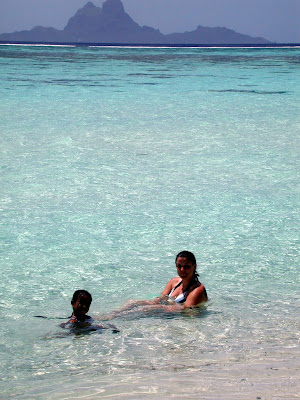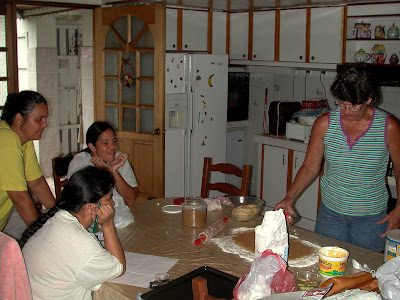Cousins Elaine and Hoanie, at the Motu. Tahaa, French Polynesia, January, 2004
Family in Far Places
Most of our kin live in California, no more than a day’s drive from my home. A few in-laws have moved east, but we are essentially a Left Coast family.
But I also have three sisters who live with their families on a pair of small islands far, far away. Kay and Raureva live on Tahiti; Dorita and her family live on Tahaa. I met Dorita in 1989, when I traveled to Fiji, Western Samoa, and French Polynesia to choose a site for my dissertation research in anthropology. When I returned to French Polynesia in 1990, I met Kay. I met Raureva in 1992, when she and Kay, along with their husbands and children (my brothers-in-law and nieces, of course) traveled to Los Angeles.
Often when my Tahitian kinfolk come up in conversation, my interlocutors will suggest–sometimes insistently–that these women are my “sisters,” not my sisters.
They’re wrong.
Cousins Elaine and Hoanie, the Night before our Departure. Tapuamu, Tahaa, January, 2004
I’ve written elsewhere about the behavioral constitution of kinship in Polynesia. Anthropologists talk about stuff like that. In short, your family, to a Tahitian, consists of those people who treat you, and whom you treat, as family.
My sisters and I have shared tearful partings and giddy reunions at docks in Polynesia and airports in California. I’ve huddled with Dorita in the corner of her concrete home, waiting out an epic gale that lashed at the walls and roof and sent rain pouring in through the glassless windows. Kay and Raureva have sent my nieces to spend summers (northern hemisphere summers) with me in California so they could improve their English.
Parting. Dorita, Pascal and Hoanie from the Ferry. Tiva, Tahaa, January 2004.
My sisters and I have worshiped together in church and at home. We’ve stood elbow-to-elbow in the kitchen, preparing food. We’ve sat up late on moonlit nights, chatting–or enjoying silence together. I taught Kay and Raureva how to make cinnamon rolls. Dorita taught me how to walk to church in flip-flops without flinging spatters of mud onto my white Sunday dress. One night in Tapuamu, I ran through the rain to the public phone at the dock to call the doctor.
My sister was sick.
Cinnamon Roll Baking. Raureva, Kay, Mirimata and me. Tahiti, January, 2004.
So, should we ever be talking about my family in Tahiti, please don’t try to tell me that somehow these people are “like family” or “almost family.”
You will never convince me.
9 Jacob was still talking with them when Rachel arrived with her father’s flock, for she was a shepherd. 10 And because Rachel was his cousin—the daughter of Laban, his mother’s brother—and because the sheep and goats belonged to his uncle Laban, Jacob went over to the well and moved the stone from its mouth and watered his uncle’s flock. 11 Then Jacob kissed Rachel, and he wept aloud.Genesis 29:9-11 (NASB)
This post is part of the community writing project, “Crossing Cultures,” organized by my friends at The High Calling.








Leave a Comment